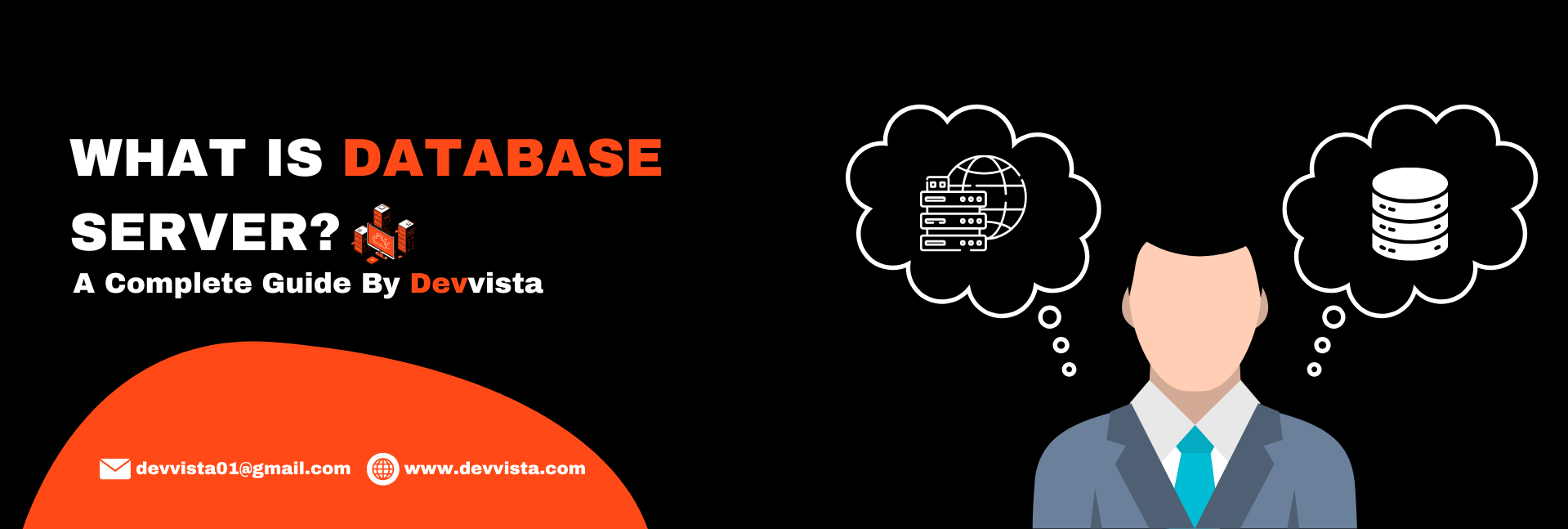
What Is a Database Server? A Simple Guide
Data is everywhere. From the apps we use to the websites we visit, data powers everything in today’s digital world. But how is all this data managed? The answer lies in something called a database server. If you’ve ever wondered how companies store and organize their information, this guide will help you understand the role of a database server and why it’s so important. At Devvista, we help businesses and developers manage their data better by setting up and optimizing their database servers and database storage systems. Let’s dive into what these terms mean and how they work together.
What Is a Database Server?
A database server is a system that stores and manages data so other applications or people can use it. Think of it as the “brain” that organizes information and makes it available when needed. Without a database server, apps and websites wouldn’t function as smoothly as they do.
Key Tasks of a Database Server:
Store Data: Safely keeps your information in one place. Process Queries: Finds and retrieves the exact data you’re looking for. Secure Data: Protects your information from unauthorized access. Allow Multi-User Access: Lets multiple people or systems use the data at the same time. Paired with efficient database storage, a database server ensures your data is well-organized, fast to access, and secure.
What Is Database Storage?
While a database server processes and manages data, database storage is where all that data physically lives. It’s like the storage room of your database system. Without enough storage space or efficient storage management, even the most powerful database server can slow down.
Why Database Storage Matters:
Space for Data: Stores all the files, records, and logs your system needs. Performance: Faster storage improves how quickly your server retrieves data. Backup and Recovery: Keeps extra copies of your data safe in case something goes wrong. At Devvista, we help businesses choose the right type of database storage, whether it’s on physical hardware or in the cloud.
Types of Database Servers
There are different types of database servers, each designed for specific needs. Let’s look at the most common ones:
1. Relational Database Server
Relational database servers use tables to organize structured data. They’re great for handling large amounts of organized information. Popular options include: Microsoft SQL Server MySQL PostgreSQL
2. NoSQL Database Server
These servers are designed for handling unstructured data like text, images, or videos. Examples include: MongoDB Cassandra
3. Cloud-Based Database Server
Cloud-based servers store data online, making it easier to access from anywhere. Examples include: Azure SQL Database Amazon RDS
4. Distributed Database Server
These servers split data across different locations, making it highly available and scalable. Choosing the right database server depends on your needs. At Devvista, we help businesses decide which type of server and storage works best for them.
Why Are Database Servers Important?
A database server is the backbone of any system that relies on data. Without one, apps, websites, and businesses wouldn’t be able to function efficiently. Here’s why database servers are so important: Centralized Management: A database server keeps all your data in one place, making it easier to manage. Fast Data Access: It processes requests in real time, so users don’t have to wait for information. Secure Information: Protects sensitive data from hackers and unauthorized access. Scalable Systems: A well-optimized server can grow with your business, storing more data as you expand. Multiple Users: Supports multiple users or systems working on the same data without causing conflicts. At Devvista, we specialize in setting up database servers that ensure all these benefits, no matter the size of your business.
How to Optimize a Database Server and Storage
A poorly managed database server can cause slow performance and even data loss. Here are some simple steps to keep your server running smoothly:
1. Upgrade Your Hardware
Choose high-speed storage drives (like SSDs) and enough memory to handle your workloads.
2. Clean Up Unused Data
Old files, duplicate records, and temporary logs can waste valuable database storage space. Regular cleanups help keep everything efficient.
3. Write Better Queries
Poorly written SQL queries can slow down your server. Optimize your queries to speed up performance.
4. Back Up Regularly
Always have a backup plan. Losing data can be costly, but having secure backups in your storage ensures you’re prepared.
5. Monitor Performance
Use tools like Azure Monitor or SolarWinds Database Analyzer to keep an eye on how your server and storage are performing. Devvista provides businesses with expert solutions to optimize their database servers and storage for peak performance.
Cloud-Based Database Servers: The Future of Data Storage
Many businesses are moving their database servers and database storage to the cloud. Why? Because cloud solutions are flexible, cost-effective, and scalable. Here are some benefits: Pay-As-You-Go: Only pay for the storage and resources you use. Easily Scalable: Add more storage or processing power as your business grows. Global Access: Access your data from anywhere in the world. Automatic Updates: Stay up-to-date with the latest security features. Popular cloud-based solutions include: Azure SQL Database Amazon RDS Google Cloud SQL Thinking of switching to the cloud? At Devvista, we guide businesses through the migration process to ensure a smooth transition.
Common Challenges with Database Servers
While database servers are essential, they can come with challenges. Here’s how to handle them: Slow Performance: Heavy traffic or inefficient queries can slow things down. Regular optimizations help. Security Risks: Without proper safeguards, sensitive data can be exposed. Strong security protocols are a must. Limited Storage: Running out of database storage can lead to issues. Monitor and expand your storage as needed. High Maintenance: Servers need regular updates and monitoring to stay efficient. At Devvista, we help businesses overcome these challenges by providing tailored solutions for their database servers and storage needs.
Frequently Asked Questions
1. What is a database server?
A database server is a system that stores, manages, and processes data for applications or users.
2. What is database storage?
Database storage is the physical or cloud-based space where all your data, logs, and backups are kept.
3. Can a database server be hosted in the cloud?
Yes! Cloud-hosted servers like Azure SQL Database and Amazon RDS are scalable and cost-efficient.
4. How can I optimize database storage?
Clean up unused files, monitor storage usage, and use high-speed storage drives to improve efficiency.
5. How can Devvista help with database servers?
At Devvista, we provide setup, optimization, and support for database servers and storage systems to ensure your business runs smoothly.
Leave A Reply
Your email address will not be published. Required fields are marked *


Comments
No comments yet. Be the first to comment!